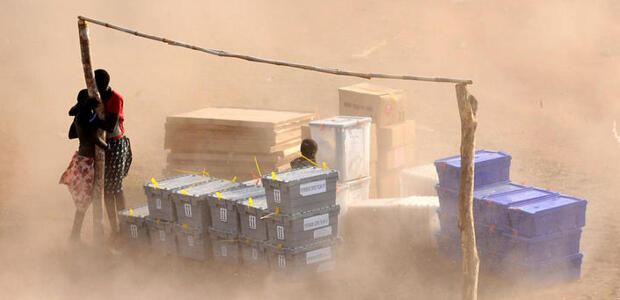Working Paper
New technologies create opportunities
This paper argues that new technologies—for communication, such as mobile phones and the internet, but also for manufacturing, agriculture, energy, and transport—have the potential to bridge many of the productivity gaps between sub-Saharan Africa...
Journal Article
Exploring regional and gender disparities in Beninese primary school attendance
DHS data is combined with school supply statistics to study primary school attendance in the 2005–06 school year in Benin, a country that has seen almost unparalleled increases in attendance since the 1990s. Results of a logistic regression model...
Presentation
Is Development cooperation still relevant in Africa? Lessons from UNU-WIDER research on aid effectiveness
A presentation by Finn Tarp, Director of UNU-WIDER at the 'Annual Meeting of Finnish Heads of Mission: Interdependence will come to the fore in global political changes'. For more information see here. Presentation slides here
Fri, 22 August 2014
Ministry for Foreign Affairs,
Merikasarmi,
Helsinki,
Finland
Past event
Panel discussion
Economic and political dynamics of Africa's emerging middle class
Economic and political dynamics of Africa's emerging middle class Robust economic growth in much of sub-Saharan Africa over the last decade is largely believed to have coincided with an expanding middle class. According to some estimates, the region...
Mon, 23 June 2014
–
Thu, 26 June 2014
Bonn,
Germany
Past event
Panel discussion
Global Development Network 15th Annual Development Conference: Structural Transformation in Africa and Beyond
UNU-WIDER Special Session: Thursday 19 June, 2014, 16:00-17:30 Lessons from UNU-WIDER research: Research and Communication on Foreign Aid; Development Under Climate Change; and Learning to Compete
Thu, 19 June 2014
International Conference Centre,
Castle Rd,
Accra,
Ghana
Past event
Seminar
Oxford Handbook of Africa and Economics
Peking University National School of Development, UNU-WIDER, African Development Bank and World Bank meeting of contributors to the Oxford Handbook of Africa and Economics.
Sun, 8 December 2013
–
Tue, 10 December 2013
Peking University National School of Development,
5 Yiheyuan Rd,
Haidian, Beijing,
China
Past event
Presentation
Aid to Africa and the Changing Context
Peking University National School of Development, UNU-WIDER, African Development Bank and World Bank meeting of contributors to the Oxford Handbook of Africa and Economics, Beijing, China. Presented by Finn Tarp, Director of UNU-WIDER. Presentation
Sun, 8 December 2013
–
Tue, 10 December 2013
Peking University National School of Development,
5 Yiheyuan Rd,
Haidian, Beijing,
China
Past event
Video
The African Energy Futures project - an interview with Channing Arndt
Channing Arndt, in this interview, provides an introduction and overview into the project on 'African Energy Futures'. Africa is well endowed with sun, wind and hydropower – but these potential resources are unevenly distributed. This could, however...
Research uptake
Learning to Compete (L2C): Accelerating Industrial Development in Africa
Learning to compete (L2C) is collaborative research project between UNU-WIDER, the African Development Bank, and the Brookings Institution. The project aims to answer the question: why is there so little industry in Africa? Industry—including modern services and agro-industry—is often the key to job creation, poverty reduction, and growth. In order to sustain economic growth African industries need to learn to compete in global markets. L2C sets out to provide better answers to a number of policy questions relevant to African industries achieving this competitiveness.
Project meeting
Industries without smokestacks
This project workshop on industries without smokestacks brings together researchers to discuss joint work on the industry sector and structural transformation in Africa. The workshop was held in Helsinki on 19-20 July 2016.
Tue, 19 July 2016
–
Wed, 20 July 2016
UNU-WIDER,
Katajanokanlaituri 6 B,
Helsinki,
Finland
Past event
About
Industries without smokestacks
Authors' workshop in Helsinki, 19-20 July 2016.
Presentation
The root causes of large scale forced migration
Director Finn Tarp made a contribution on international migration in a policy seminar hosted by the Ministry for Foreign Affairs of Finland.
Wed, 24 August 2016
Ministry for Foreign Affairs of Finland,
Laivastokatu 22,
Helsinki,
Finland
Past event
Presentation
 Africa's Lions: Growth Traps and Opportunities for Six African Economies
Africa's Lions: Growth Traps and Opportunities for Six African Economies
Thu, 3 November 2016
Brookings Institution, Saul/Zilkha Auditorium,
1775 Massachusetts Ave,
Washington, DC,
United States
Past event
Project
Building African capacity for policy simulation
Theme: 1985-97
With the introduction of Poverty Reduction Strategy Papers (PRSPs) and Millennium Development Goals (MDGs), governments in Africa and other developing countries have been under great pressure to devise effective policies that will reduce poverty and...
Project
Natural resources, structural change, and industrial development in Africa
Theme: 2016-17
This project focuses on three specific areas that impact the pace of structural transformation and job creation in five emerging African natural resources economies: Ghana, Mozambique, Tanzania, Uganda, and Zambia.
Project
 Africa's energy futures
Africa's energy futures
Theme: 2014-15
Project
Africa's emerging middle-class
Theme: 2012-13
Sub-Saharan Africa currently is facing a range of demographic and socioeconomic shifts that hold important implications for both the region’s economic and political development. One of these shifts has been the emergence of a sizeable and dynamic...
Project
Reconciling Africa’s growth, poverty and inequality trends: growth and poverty project (GAPP)
Theme: 2012-13
Despite decades of research and advances in data and methods, measuring poverty and reconciling this with patterns of economic growth remains a complex and contentious issue. UNU-WIDER’s Growth and Poverty Project (GAPP) re-examines Africa’s growth...
Project
Southern engines of global growth
Theme: 2006-07
The project centers on the inter-linkages between the major developing countries of Brazil, India, China and South Africa and the global economy, with a special emphasis on the implications of China’s growth on smaller economies and the rest of the...
Project
Gender and food security
Theme: 2006-07
UNU-WIDER’s recent project ‘Hunger and Food Security’ exerted a strong attraction for academia, international organizations (FAO, WFP, and UNCTAD), civil society organizations, and the media. The first project meeting, held in Jaipur in March 2005...
Working Paper
Agro-processing and horticultural exports from Africa
Sub-Saharan African exports of horticultural and processed agricultural products are growing in line with the major shift towards these products in world markets. Continued growth in these exports may be vitally important for expanding returns from...
Working Paper
Industrial clusters
Firms tend to cluster in close geographic proximity to each other to benefit from reduced transport costs, shared inputs, and productivity spillovers due to learning and technology transfers. Evidence from low-income countries suggests that such...
Working Paper
Tourism global value chains and Africa
As Africa continues to attract record numbers of international arrivals, there are industry undercurrents that influence the continent’s participation in tourism value chains. African tourism is characterized by high foreign demand, which elevates...

 Join the network
Join the network











